Random Reviews: John Constantine, Hellblazer (vol. 1): Original Sins
This first volume collects a small portion of a classic series, occasionally muddled but driven by its fractured protagonist
—by Nathan on August 19, 2024—
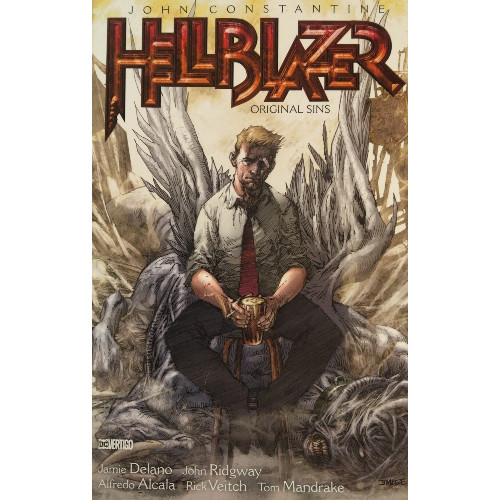
The DC horror train continues.
We last examined the first chapters of Alan Moore's pivotal run on Swamp Thing, a title originally published under the DC banner proper before being moved over to the company's burgeoning "Vertigo" line when that imprint was instituted by Karen Berger in the 90s. Hellblazer was one of the other seven titles which migrated over to the less kid friendly arm of DC Comics publishing. As I examine narratives from other publishers such as Image, I hope to occasionally take a gander of some of these early Vertigo candidates; with luck, we'll even touch on some of the titles published directly under the Vertigo banner itself.
Aren't you just squealing with delight?
Or it might not be delight. It might be the horror train.
We're traveling into the darkness again for this next Vertigo installment, collecting the first several issues of a title birthed in the same mire as old Swampy himself. Created by Alan Moore, John Constantine plugs into the grimmer, magic socket of the DC Universe. He's not really a wizard or even a magician. Conjurer, maybe? Wikipedia refers to him as a "sorcerer." That might be the best word for it. He doesn't fit the mold of a magician anyway. Have you ever seen a magician in a long brown trench coat who smokes and drinks himself into oblivion on the regular? Doesn't sound like the kind of guy you'd invite to your kid's birthday party to pull rabbits out of a hat.
John Constantine, Hellblazer (vol. 1): Original Sins
Writers: Jamie Delano, Rick Veitch
Pencilers: John Ridgway, Bret Ewins, Jim McCarthy, Rick Veitch, Tom Mandrake
Inkers: John Ridgway, Alfredo Alcala
Colorists: Lovern Kindzierski, Tatjana Wood
Letterers: Annie Halfacree, Todd Klein, John Constanza
Issues: John Constantine, Hellblazer #1-9, Swamp Thing #76-77
Volume Publication Date: 2011
Issue Publication Dates: January-October 1988
Publisher: Vertigo (DC Comics imprint)
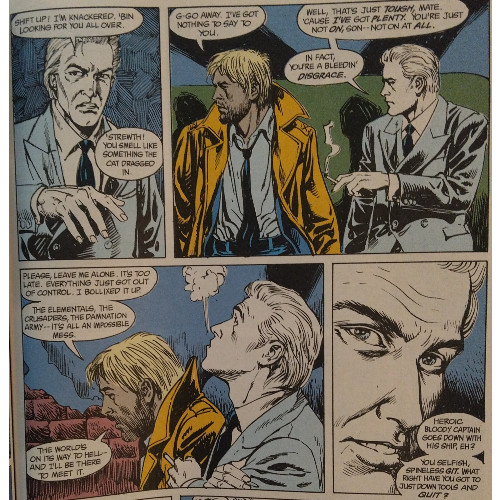
Magic's a messy thing, innit?
All those spells you gotta remember, first of all. And all those items which can fall into the wrong hands. And then you start involving ghosts and demons and alla that crap, and everything becomes one big pile of puke. That's why you have guys like Constantine, though. So someone out there can straighten whatever goes wrong.
The British John Constatine was originally created by Alan Moore in Swamp Thing #37, which means that if I ever continue reading Moore's run, I’ll eventually run into those issues. Seeing as how I have not read them, however, I cannot build off whatever context they provide. All we have to go on for now are these issues, where another British writer, Jamie Delano, took a crack at Constantine.
The results? Approximately magical, I suppose. Maybe mystifying. Sometimes downright demonic.
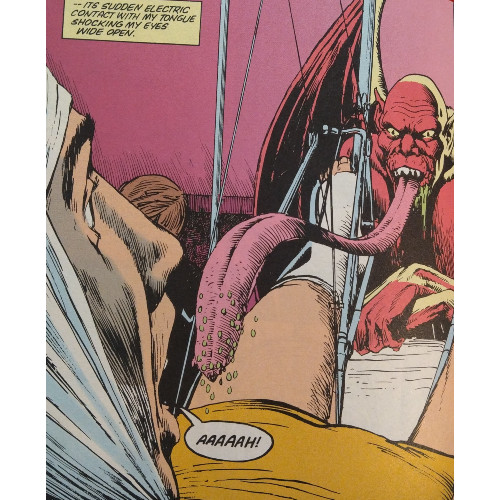
Moore's writing, in both Swamp Thing and Watchmen, carries a particular cadence, a marked poetry found in text boxes and speech patterns. When I began reading this volume, I sighed when some of the same tricks popped up in Delano's writing, and I marked the guy as a poor man's Moore. It wasn't that his writing was stilted in the same way Geoff Johns' was in Doomsday Clock when he intentionally aped Moore's style and achieved a lesser effect; it was that Delano resorted to similar tricks, clever descriptions and metaphors that worked well on their own but, perhaps given Moore's hand in Constantine's creation and the proximity of this book to Swamp Thing, felt like a copycat at the core.
Were Delano writing another book or Hellblazer not associated with Vertigo, I may have initially been more generous. Text such as "Overhead, ominous clouds gather like tumors…You can feel it…Bulbous, bloated, the irresistible tension–the promise of emotional lightning" is remarkably descriptive. The eerie imagery of clouds as tumors. The thought of what emotional lightning would look like. Very well-wrought and poetic…yet it felt like a Moore trick, like he would write something similar. Delano's tone grew on me the deeper I read, but for the first several issues, I didn't give him quite the credit I would or should have.
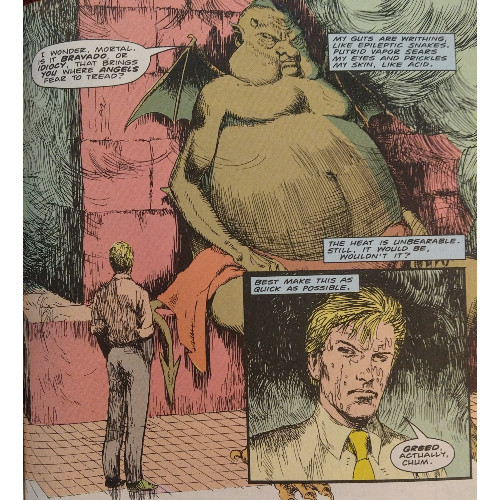
Tonally, there's a sneaky suspicion of copycat antics too. You can't quite blame Delano for this, as Constantine originally rose from the same terror-encrusted, horror-infested muck from which Swamp Thing also ascended. There's a pall of darkness over every issue, whether through the macabre machination of demons or the more base injustices committed by men. There's violence and shadows and monsters lurking around every corner, whether they bear jagged horns and slithering tongues or the face and shape we each find in the mirror. It rarely lets up. I'd say these first Hellblazer issues derive more darkness from its subject matter, not just from what it chooses to portray, but from its central character's particularly grim outlook. There is no promise of hope or even much purpose here, at least not in any way comparable to how Swamp Thing eventually sniffs out his own reason for existence. Constantine drinks and smokes and lives haunted by ghosts.
Yet Delano diverges in two other places than just the general feeling of despair. His Constantine, though generally unlikable, is not wholly unfeeling nor incapable of deriving empathy from the reader. He's been dealt a bad hand, essentially, and when he can't numb himself enough or rebel enough against it, he employs that stiff upper lip and presses on, into the depths. His addictions are treated as almost natural, like you would be the exception if you dealt with the horrors he dealt with and didn't find yourself on the receiving end of a whiskey bottle at the end of the day.
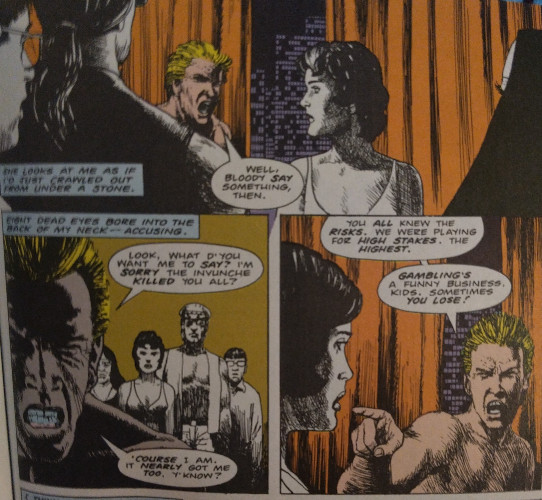
There's a bit of Sherlock Holmes in him, that the fulfillment he finds in his calling, serving as this guardian of earth from an influx of demonic forces, is what drives his daily living…that, as much of a mess as he is, without this singular purpose, he'd be worse. Unlike Swampy, Constantine doesn't seek out his mission…it's his, he's been given it, and you wonder, if someone tweaked his disposition and gave him something different to do, he'd do that instead. But no one will, and he's got nothing else, so he needs to press on, because what else is there? That drive places Constantine in several situations where he is forced to make agonizingly difficult choices, some where he chooses to willingly sacrifice the welfare of certain folks for the betterment of others. More ghosts to haunt him.
Delano also succeeds in grafting these horror-fueled stories to reality, which makes them all the scarier. I've been listening to true crime podcasts lately, and I feel I unintentionally placed myself in a position where the core "realness" of some of these stories echoed more deeply. You feel the terror of Constantine tracking down his niece before she can be made into a child bride/sacrifice of a serial killer. The appearance of ghost soldiers only enhances the eeriness of a story centered on the mental illness of a Vietnam veteran. Constantine disrupts the machinations of demons influencing a British election, his actions turning a significant tide in a way no one will ever find out because who'd ever believe the drunk sorcerer in the trenchcoat claiming demons rigged an election? He's a hero left in the darkness, with only his unseen audience cheering him on from a world away as they ponder this intersection of the magical and the mundane. Tell me, how would you respond if you knew, for absolute certain, than an upcoming election was influenced by the demonic?
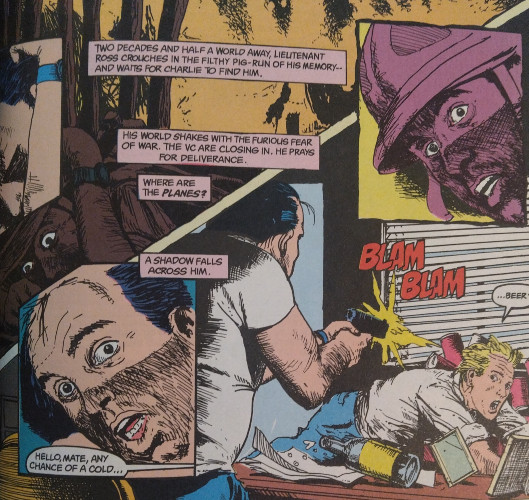
These are the shadows Constantine wades through…shadows which leech through your soul if you've ever known the fear surrounding a missing child, the strain of mental illness inflicted on a loved one, or the anxiety of an upcoming election season (which, as an American, I can promise never happens). Delano almost offers reassurance through some of these tales–looking for someone to blame about an election going sour? Demons. Worried about an unstable Vietnam veteran? Probably ghosts. And yet he strikes a balance–for every plot and conspiracy which has a magical or spiritual tether to it, there are one or two with very real human faces. A gang of British boys actively chooses to beat up folks they label as "other" and "lesser." A serial killer targets young women. Even a few groups of religious fanatics seem to act out of purely twisted logic, no spiritual or demonic batteries required. Just humans acting out of their most base, selfish principles. The darkness makes Constantine's perseverance even more admirable, particularly when he claws himself back to his senses after one especially bad situation leaves him far worse off than he already was.
I'll admit there is meaning here which eluded me. The series can toss around a lot of British terminology and is ingrained in British pop culture and political events. I was able to draw in the generalized meaning within the situations–the injustice behind people beaten for their different appearances, the panic towards a spreading virus, the dread of an upcoming election–even if I didn’t fully piece together the specifics. Delano makes his general ideas and philosophies clear, reminding me of narratives such as Grant Morrison's Arkham Asylum: A Serious House on Serious Earth or even Christopher Priest's Black Panther, both of which are intellectually challenging works of paneled fiction with resonating emotions and symbolism that should impact the reader even if they miss some of the specific details. I appreciate stories which ask you to pay attention but mercifully offer some leeway if you blink and miss a few pieces here and there. This first volume of Hellblazer succeeds there, offering a primary protagonist standing (often alone) against the terrors of the worlds present, above, and below.